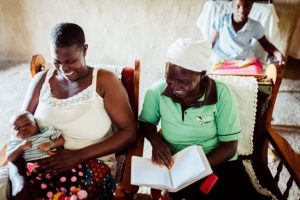The Problem Lwala Community Alliance is Working to Solve
Community health systems are the first line of defense in preventing and treating illness–and in ensuring health care for all. In Kenya, the community health system has been characterized by chronic under-investment, health worker shortages, and exclusion of community voice in designing and delivering health services. While community-led solutions–including professionalizing community health workers (CHWs) and incorporating traditional birth attendants (TBA)–have shown great promise, they are not often prioritized in policy and programming. This leads to poor health outcomes–70,000 mothers and children die each year, nearly all from preventable and treatable conditions–and hinders Kenya’s progress toward Universal Health Coverage for all.
Why We’re Excited About Lwala’s Impact Potential
Lwala’s focus on community-led health care has paved the way for major improvements in health outcomes in the rural county of Migori, where it was founded. Lwala’s community-led health model has four pillars: strengthening community committees to lead health initiatives, delivering health services through a professionalized cadre of CHWs, improving quality of care at health facilities, and generating data and evidence to inform decision-making. Over the past 14 years, Lwala has tested and adapted its model, generated evidence to support its impact, and established critical partnerships with governments and peer organizations.
More reasons why we are excited about Lwala include:
- Putting communities at the center. Lwala works to build the capacity of rural communities to advance their own comprehensive well-being, which stems from its core belief that no one is better placed to create change in their communities than the people who live there. Through its community-led health model, Lwala has established a process through which communities can identify their health care assets and needs, and then bring together key stakeholders to launch holistic health initiatives.
- Transforming health systems. The data and insights from Lwala’s community-led health model are uniquely positioned to transform health systems in Migori County and throughout Kenya. Lwala partners with national and county governments to advance community health programs, professionalize CHWs, and employ digital solutions that improve service delivery and data-informed decision-making.
- Local solution and leadership. Lwala was founded by a group of Kenyans who are from the community where the organization operates. Employees of Lwala also reflect the population it serves.
- Resilience. The major disruption of COVID-19 has validated Lwala’s model and impact, as key health indicators tracked by the organization have remained steady–or improved–throughout the pandemic. This resilience and ability to sustain outcomes makes us confident that Lwala, and its community-driven model, can withstand any future disruption.
The Plan to Achieve Impact at Scale
Ultimately, Lwala seeks to provide high-quality community health services, as well as elevate community-led solutions in policy and practice at the county, national, and global levels. Lwala’s scaling strategies include:
- Expanding direct service delivery through community-led approaches: Lwala will expand its community health program in Migori County, strengthen local accountability mechanisms, establish Lwala Community Hospital as a center of excellence, and implement quality improvement initiatives at partner health facilities – ultimately reaching 1.1 million people.
- Enabling governments and partners to adapt and implement the model across the health system: Lwala is also advancing evidence-based, community-led solutions–including professionalizing CHWs, incorporating TBAs into the community health workforce, and strengthening community committees–at the national and global levels.


